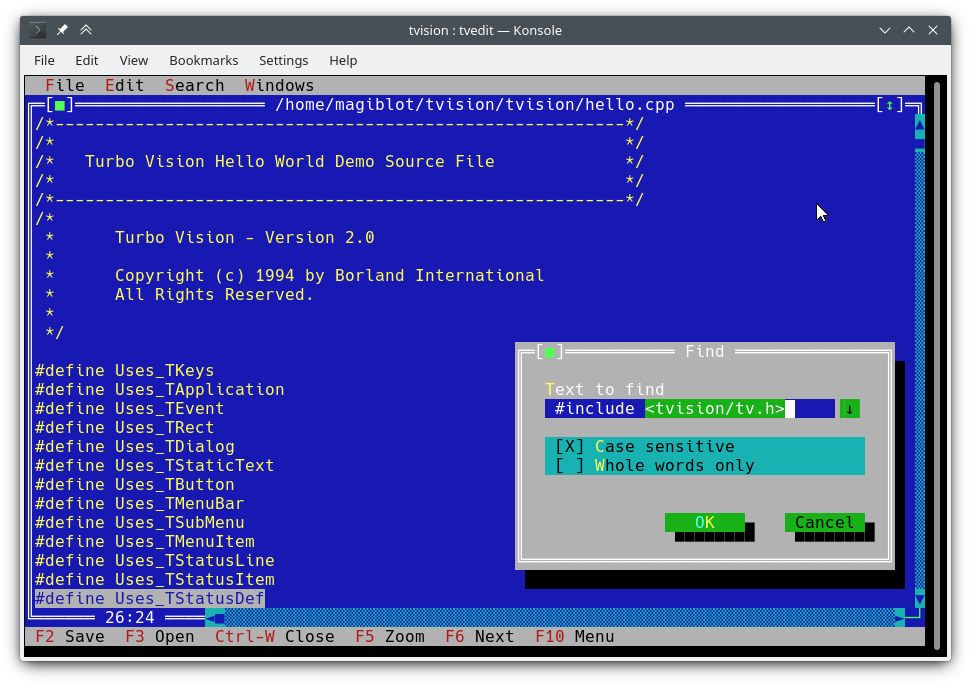I watched oppenheimer in emacs, u watched it in imax, we are not the same
Too bad Emacs doesn’t have a good text editor.
Evil mode helps with that
Modalka for me. It has exactly what you want and no more, which also makes it a lot easier to learn: useful for me that I’m not a programmer.
eMacs takes a life time to learn, so the sooner you start, the longer it will take.
Upvote just for “melon husk” 😂
There was another Twitler who tried to create an everything Reich.
Elon is racing him to see who can collapse a thousand-year social media platform the fastest
Emacs is the GOAT computing environment.
I couldn’t help but think of Emacs when I was reading A Constructive Look At TempleOS. It’s like TempleOS that is actually finished, it just lacks kernel.
just lacks kernel.
Sounds like a trademark of GNU tbh
GNU Hurd is going to be mainstream any minute now.
cough32bitcough
I’m sure the port to TempleOS is being worked on as we speak
Thanks for sharing. I have never seen that deep dive into templeOS before and it is a much more interesting OS than I anticipated.
Yeah it’s pretty amazing system all things considered. It’s kind of as if 8-bit home computer systems continued to evolve, but keep the same principles of being really closely tied to the HW and with very blurry line between kernel and user space. It radiates strong user ownership of the system. If you look at modern systems where you sometimes don’t even get superuser privileges (for better of worse) it’s quite a contrast.
Which is why it reminds me of Emacs so much. You can mess with most of the internals, there’s no major separation between “Emacs-space” and userspace. There are these jokes about Emacs being OS, but it really does remind me of those early days of home computing where you could tinker with low level stuff and there were no guardrails or locks stopping you.
So you’re saying it’s like the GNU operating system?
Surely Elon would prefer the old Lucid fork, https://www.xemacs.org/
What even is emacs
An extremely extensible text editor, there’s jokes that it can do literally anything, you can play music, watch video, etc.
It’s often at war with the cult of vi and the church of emacs.
Don’t forget us nanoites. The clearly superior text editor
nanoers just never figured out how to :wq
if you listen closely, you can still hear the terminal bells ringing of those that never managed to ESC
Those who never managed to ESC, reset.
Use
:xyou plebThey just said
:wqin school, so thanks for the tip. Hard to believe it saves even when the file hasn’t been changed if you use:wq. What is the use case for that? If the file gets changed in another program and you want to revert?? Edit: Just saw the comment about the modification times being updated.But what if you wanted to write even if there weren’t changes?
And how often do you want to do that exactly?
Then you use
:wq
habit lol. i use :w a lot so :wq feels like a natural extension
Heh yeah and it’s not like it makes any difference; they’re effectively the same thing.
:wqjust updates modification time even if there were no changes – same as doing:wand:qseparately – but:xdoesn’t. Super intuitive interface 😅
:x? Real Programmers useZZ.
I don’t do a lot of text editing in terminal, but I used to have to at my last job and I always reached for nano and gave instructions fot nano since it’s just pick up and use.
Nano just feels sluggish as soon as you know vim keybindings. Emacs is a bit overkill for some quck edits, but nano is just to basic
deleted by creator
As a nanoite who couldn’t be bothered to learn editor commands, I switched to turbo, which is essentially a linux port of the DOS text editor

Huh, interesting!
I was using vim for the first time the other day and I was running through the built in vimtutor. I got a call from a friend and they asked what I was up to, and I said I was doing a tutorial for a text editor. At that moment, I felt simultaneously very silly and very smart.
By “as soon as you know” you mean “as soon as you have put those bindings to muscle memory”. Knowing them isn’t really enough.
Well yeah, I’d say the same concept applies to using anything tech related these days. It’d be like if you “knew” where all of the keys on a keyboard layout that you don’t normally use are located - you’d still need muscle memory to actually use it efficiently.
Yeah, again, I don’t do much terminal text editing. I have an IDE. If I’m trying to help someone across the country 1000 miles away fix something on the machine I develop for, I’m going to give them instructions on something that will be incredibly easy to use. I don’t want to have to explain why the arrow keys aren’t working and why they have to use jkl; to navigate or explain how enter edit mode or how so save and exit. Keep it simple stupid.
deleted by creator
I’ve thinking of using Usenet. What client would you recommed for mobile and desktop?
deleted by creator
Aw man, now I have to download an whole OS just to use Usenet? /s
deleted by creator
You should really convert to helixism, the latest messianic update to the cult of vi.
ill try it again when it support pulgins
I mean it does support LSP, natively, I found that ultimately that’s all the plugins I really need. It working out of the box and not requiring megabytes of configuration files is one of its great strengths.
If all you need is some customisation it’s perfectly possible to write custom commands that execute sequences of commands. Including calling out to the shell and piping to and from external programs. Strictly static sequences though unlike the abomination that is vimscript they’re not making keybindings a scripting language…
I’m a vim and emacs user for some decades already. I had this urge one day to try and work with helix. It kind of misses some things such as file manager or editorconfig support. Nine months later I’m still using helix. It still misses these things, but I really started to like how I don’t need any plugins to work with it and I need about five lines of configuration to have a usable editor. Probably going to continue using it.
And it is written in Rust, which is my main language and I can just jump in to the editor source and fix things if needed.
I miss magit and org from emacs a lot though. Every time I need to write an article, I do it in emacs.
It’s probably this, for all of you whou didn’t know Helix before, like me: https://helix-editor.com/
Indeed. Make sure to start it with
hx --tutorthe first time around so you know how to quit :)And no matter what you do when giving it a try do it in a time and place where you can go at least a week without vi as the command grammar is close yet different enough to completely confuse your muscle memory, you don’t want to mix them up (helix uses a strict selection-action command set so you get ‘wd’ instead of ‘dw’ and stuff).
Eight Megs And Constantly Swapping
Esc-Meta-Alt-Ctrl-Shift
A self-documenting, extensible lisp computing environment that uses text buffers as its main data format.
Which video player did you use?
im a vim user, i dont usually put videos players in my text editor
otherwise, i use mpv for desktop
It’s possible to watch videos in the terminal as ASCII art with both vlc and mplayer, by the way.
mpv --vo=tct
Sorry mate, my tired brain interpreted the post in the picture as something you’ve written :)
OP did write the part you’re referring to lol
Oh man, I really should be getting more sleep :D
Late 30s dev here: I’ve never cared to learn emacs or vim, tried when younger, but left it. Am I a fraud?
I used to be a vim fan but now I only use it for modifying files over SSH. Other than that I code with an IDE, you can’t beat all the plugins and linters with a in-terminal editor. A colleague still codes in emacs and its code is dirty af.
A colleague still codes in emacs and its code is dirty af.
PEBKAC - don’t blame emacs (not sure why anyone would use it when vim exists, though)
I mean, I use a plugin manager for Neovim myself, and you can pretty much configure it to however you like.
Someone even make an inline markdown preview for the editor using sixels (in terminal image display).
but still I prefer the markdown preview plugin as it previews the file using a browser is format rly similar to github’s styles
What’s emac?
It’s an iMac with electronics in it.
It’s like a Big Mac but with emu meat.
Ain’t that one of them Mortal Kombat fighters?
My fav one.
emaX


















